(Note: This post was already published in the City-REDI website.)
Optimizing entrepreneurial development process for smart specialization in the European Union by Laszlo Szerb, Raquel Ortega-Argiles, Zoltan Acs and Eva Komlosi published in Papers in Regional Science demonstrates how the Regional Entrepreneurship and Development Index (REDI) can be used to optimize local entrepreneurial discovery processes, in a manner which can support the construction of regional Entrepreneurial Ecosystems and the design and implementation of Smart Specialisation policy Strategies (S3) and Local Industrial Strategies (LIS).
This work is part of a series of papers and reports based on the REDI index (Acs et al., 2015; Komlosi et al., 2015), the regional application of the Global Entrepreneurship and Development Index.
The REDI index argues that entrepreneurship should be treated as a systemic phenomenon, and it should be measured accordingly. Although entrepreneurial actions are ultimately undertaken by individuals, these individuals are always embedded in a given regional context. This context regulates who becomes an entrepreneur, what the ambition level of the entrepreneurial effort is, and what the consequences of entrepreneurial actions are. Because of this embeddedness and the regulating influence of context, we have chosen to develop a complex composite index that captures both individual-level actions as well as contextual influences.
The (REDI – Regional Entrepreneurship and Development Index) takes into account both individual entrepreneurship attitudes and characteristics and the regional context and, accordingly, not only whether people are willing to start a business but whether the conditions to do so are in place in the region concerned. As can be seen in the below figure, the index is composed of three sub-indices covering entrepreneurial attitudes, abilities and aspirations. Each of the sub-indexes has an individual component (relating to the individual decision-making behaviour) and an institutional component (relating to the context). Entrepreneurial attitudes indicate the attitudes of the population in a region as they relate to entrepreneurship, including elements such as perception of opportunities and risks, cultural support and networking. These are measured by indicators of market agglomeration, social capital and the extent of corruption. Entrepreneurial abilities measure characteristics of entrepreneurs and business start-ups with high growth potential, such as the take-up of technology, the level of human capital and the degree of market competition.
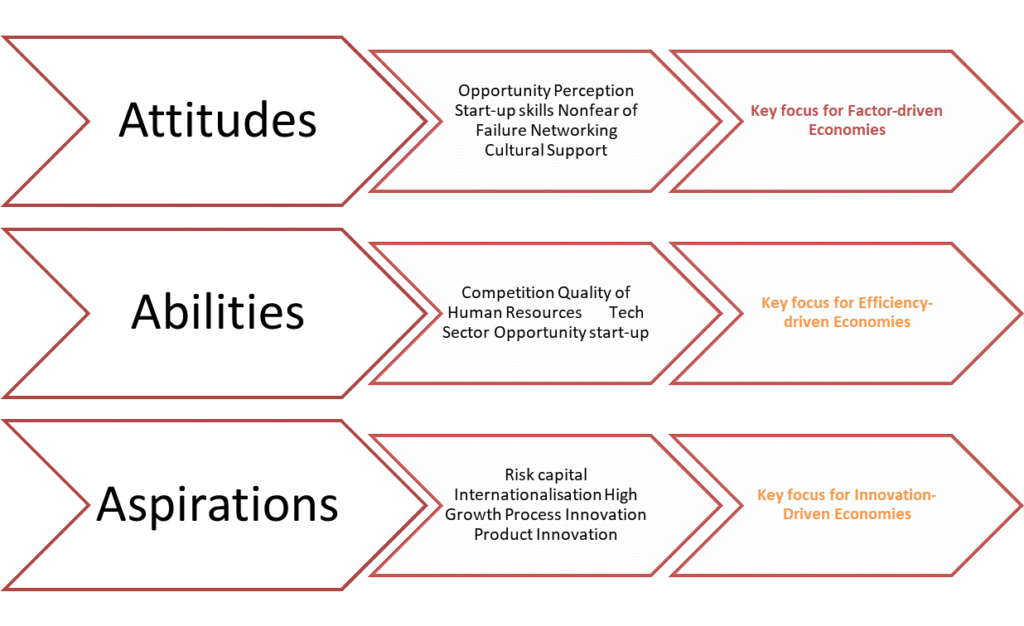
The index contains both individual-level and institutional or environmental indicators, which reflect the regional context. For example, a factor such as the perception of risk is the outcome of combining an institutional factor (the actual business risk faced by a start-ups as measured by the business closure rate) and an individual one (the personal acceptance of risk by entrepreneurs, measured by the proportion of the population aged 18-64 stating that the fear of failure would not prevent them starting a business).
The first distinctive features of the REDI index – notably, its systemic approach and the Penalty for Bottleneck feature – can be leveraged to support Entrepreneurial Discovery processes in two distinct ways, as regions develop Smart Specialization Strategies. First, the index itself provides initial clues on whether a given region’s strengths and weaknesses might be found. Second – and more importantly, the REDI index can be used as a platform that facilitates the design of effective policies to support Entrepreneurial Discovery. If used in a correct way, therefore, the REDI index can support the preconditions for creating Regional Smart Specialization Strategies.
Entrepreneurial dynamics in regions are complex, and an understanding of them requires a holistic approach. This is why the REDI index was designed to incorporate 14 different pillars, each created as a product of individual-level and system-level data. A careful scrutiny of the relative differences between individual pillars, both within a given region and across benchmark regions, should provide good initial guidance for the search of prospective strengths and weaknesses within regions. From a policy perspective, it is important to recognize that the portfolio of policy measures to address regional are likely to be equally complex and intertwined as is the system itself.
As shows Figure 2 below, the REDI index reconciles the approaches of the two most important entrepreneurship policies: Entrepreneurial Ecosystems and Smart Specialisation by incorporating the micro level (individual entrepreneurship) and the meso level (industrial as well as regional) aspects in the systemic process. We argue that the use of REDI for policy implementation can be used to cover industry diversification and specialisation processes embodied in the emerging industries processes as well as entrepreneurial discovery process improvement embodied in new firm formation and its complementarities. Finally, the REDI index allows to influence different regional development aspects such as regional innovation, local development, economic growth and new jobs.
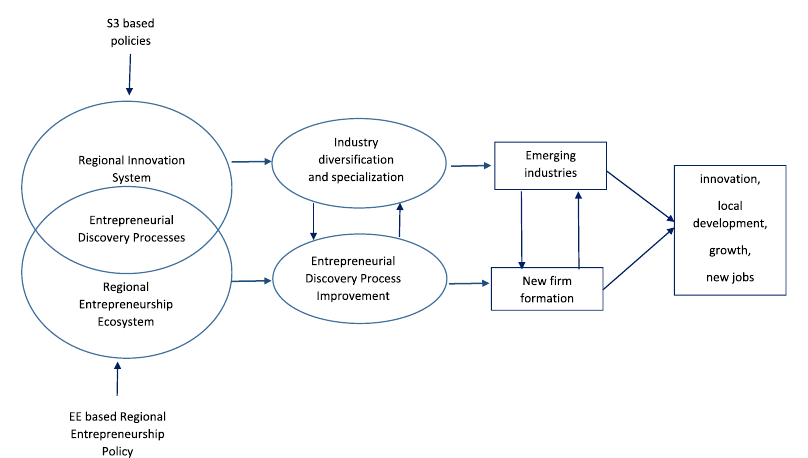
Source: Szerb et al. (2020)
The REDI index is also a tool to evaluate and influence the improvement of any type of regional entrepreneurship ecosystems. The most important message for economic development policy is that improvement can only be achieved by abolishing the weakest link of the system which has a constraining effect on other pillars and consequently on the entrepreneurial ecosystem as a whole.
UK regional entrepreneurial ecosystems: an illustration
In our latest publication Szerb et al. (2020), we show the possibility of using the REDI index as a tool for creating a taxonomy of regions based on the characteristics of the entrepreneurial environment to be used to support Smart Specialisation (S3) as well as Local Industrial Strategies (LIS).
UK’s regions are classified in Cluster 1 and Cluster 2. Cluster 1 regions are the most entrepreneurial regions in the EU, among them London, East of England and South East, they scored the best in 10 out of 14 pillars except risk perception, networking, cultural support and opportunity start-up. West Midlands and East Midlands are included in Cluster 2, in general they lack aspiration related pillars of high growth, globalization, and financing.
In the UK, the values of the REDI index for its different sub-indices illustrated in the table below exposes the heterogeneity in the quality of regional entrepreneurship ecosystems.
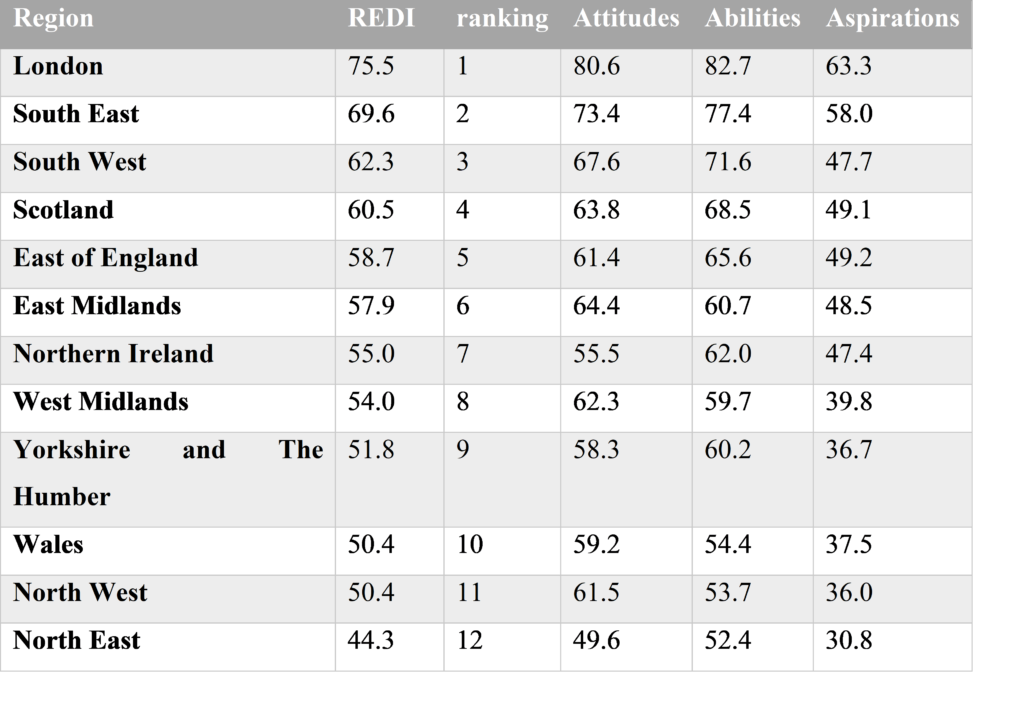
The top UK’s regions are London and South East, they are the first and second region respectively in the UK’s REDI raking as well as the three REDI sub-indices on entrepreneurial attitudes, abilities and aspirations. North East region appears as the bottom region in all the three sub-indexes.
The below figure illustrates the variance of the REDI pillars’ values for the case of the UK’s regional average. The UK’s average region presents higher values of risk aversion and competition and human capital with respect to the EU 125 regions. The areas of attention are risk capital, internationalisation and product innovation, among others.
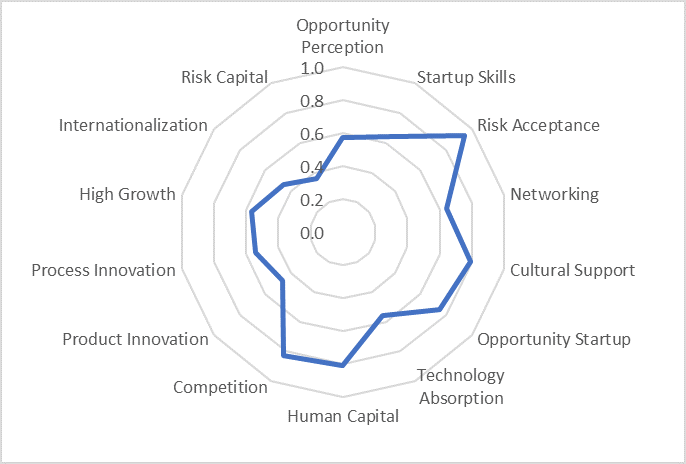
The REDI index allows regional comparisons between different regions. Figure 4a compares the West Midlands and London regional entrepreneurial ecosystems while Figure 4b compares the West Midlands and East Midlands ones with the UK’s regional average.
As can be depicted by looking at the pictures, the weakest areas in the West Midlands entrepreneurship ecosystem seems to be around financing (risk capital), innovation (process innovation, product innovation and technology absorption) and skills (human capital and start-up skills). London’s entrepreneurial ecosystem seems to excel in many areas with risk capital and process innovation appearing as the weakest links. In the case of East Midlands, the index shows that the weakest areas in its entrepreneurial ecosystem are risk capital and high growth.
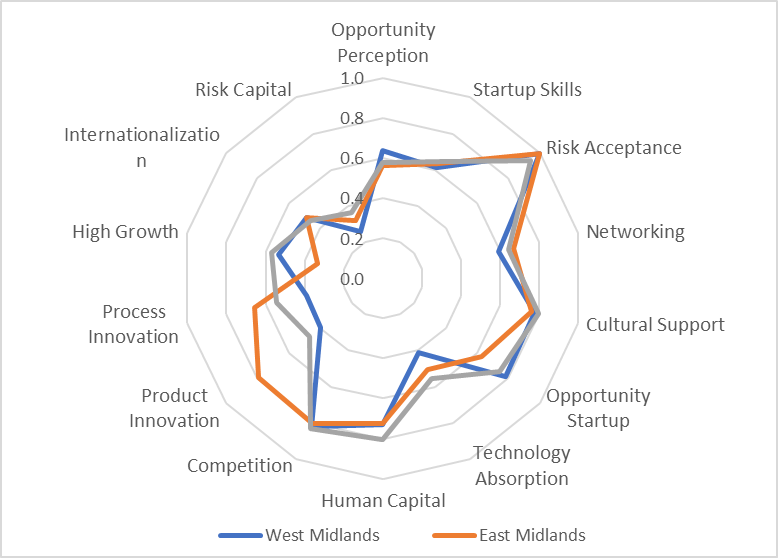
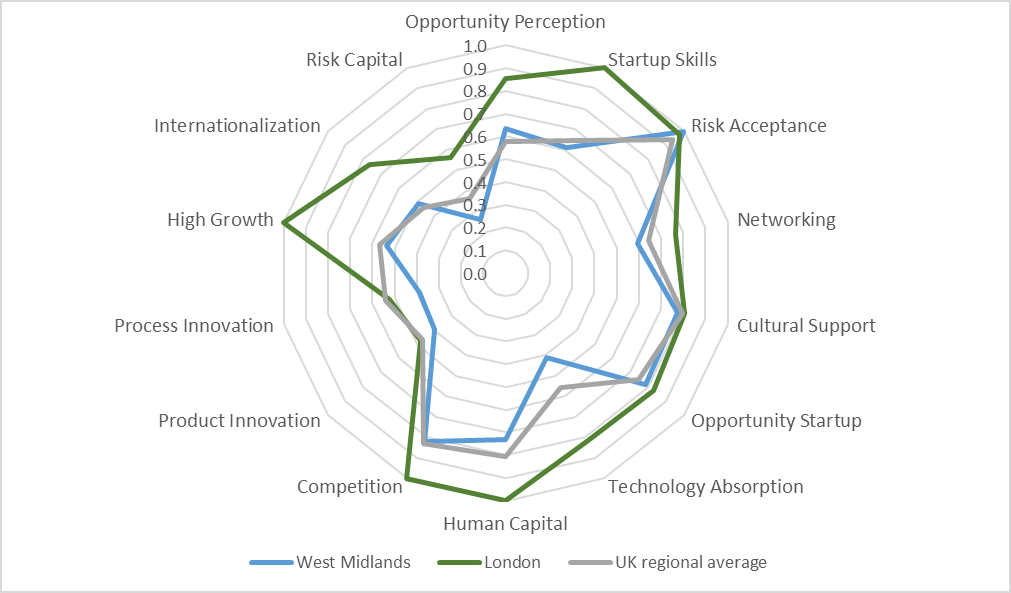
The REDI index also allows historical comparison, Figure 5 illustrates the evolution of the entrepreneurial ecosystem in the West Midlands during the last years. As can be seen some areas have improved such as opportunity perception, networking, cultural support, opportunity start-up or competition. Other areas such as financing, human capital, high growth seemed to have decreased. While areas such as risk perception, product and process innovation, start-up skills or risk perception seem to have not changed over the period under analysis.
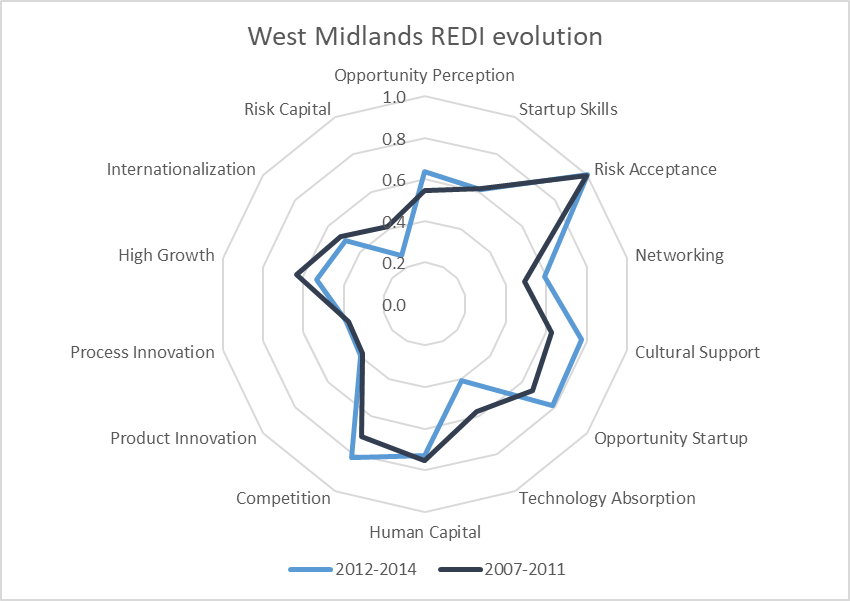
The index also allows to determine areas that may require local attention versus areas that may require national attention as lower values in certain pillars are presented in many regions, that it is the case of risk capital for the UK’s case.
REDI index as an optimisation tool for regional entrepreneurship and innovation policy
In this paper, we show how the Regional Entrepreneurship and Development Index (REDI), a measure of local entrepreneurship ecosystem, can help to identify the inhibitors to local entrepreneurial discovery processes, in a manner which can support Smart Specialization Strategies (S3) policy prioritisation (Foray et al, 2012; McCann and Ortega-Argiles, 2015 and 2016; Varga et al., 2020). Next, we explain the structure and the calculation methodology of the REDI that is a holistic measure of entrepreneurship ecosystems. We then discuss how the REDI could contribute to Smart Specialisation policy implementation by providing a solution to four S3 policy caveats as (1) measuring the necessary basic conditions for smart specialization in a mix of 125 NUTS 1 and NUTS2 European Union regions; (2) identifying the institutional and individual weaknesses at local levels; (3) providing a comprehensive view about the harmonization of the components of EE; and (4) presenting some simulations on how additional policy efforts could be optimized. REDI based suggestions are place-based and offer a rationale for tailor-made regional policy interventions. While Smart Specialisation industry prioritization is based on the identification of local strengths, REDI improvement can be achieved by improving the weak features of the entrepreneurial ecosystem. This tool can also be helpful in the design and implementation of the current UK’s local industrial strategies.
References
Acs, Z., Szerb, L., Ortega-Argilés, R., Aidis, R. and A. Coduras (2015) “The Regional application of the Global Entrepreneurship and Development Index (GEDI): The Case of Spain”, Regional Studies, 49(12), 1977-1994.
Foray, D.; Goddard, J., Goenaga, X., Landabaso, M., McCann, P., Morgan, K., Nauwelaers, C., Ortega-Argilés, R., Mulatero, F. (2011) RIS3 GUIDE, European Commission – Regional Policy and Institute for Prospective Technological Studies, Joint Research Center, Smart Specialisation Platform:
Komlósi É., Szerb L.; Acs J. Z., and Raquel Ortega-Argilés (2015): Quality related regional differences in entrepreneurship based on the GEDI methodology: The case of Hungary, Acta Oeconomica, 69(3) 455-477.
McCann, P. and R. Ortega-Argilés (2015) Smart Specialisation, Regional Growth and Applications to EU Cohesion Policy, Regional Studies, 49(8), 1291-1302.
McCann, P. and Ortega-Argilés R. (2016) Smart Specialisation, Entrepreneurship and SMEs: Issues and Challenges for a Results-Oriented EU Regional Policy, Small Business Economics: An Entrepreneurship Journal, 46(4), 537–552.
Szerb L, Ortega-Argilés R, Acs ZJ, and Komlósi É. (2020) “Optimizing entrepreneurial development processes for smart specialization in the European Union”, Paper Regional Science, 1–45. https://doi.org/10.1111/pirs.12536
Varga, A.; Sebestyén, T; Szabó, N. and Szerb, L. (2020) Estimating the economic impacts of knowledge network and entrepreneurship development in smart specialization policy, Regional Studies, 54:1, 48-59, DOI: 10.1080/00343404.2018.1527026

Thanks! The Redi index will give us an exact number
you can achieve happy wheels online
Thanks for this informative blog. Looking forward to your other post.
Posting a best personal statement writing service as a college application might be exciting, but it also needs a great deal of effort, focus, and study. This type of essay writing requires a lot of attention and time. A well-written college essay may leave a lasting impression on the admissions staff of the university to which you wish to apply.
Narrative essays, descriptive essays, expository essays, and persuasive essays are all examples of these types of writings. https://www.bestcustomwriting.com/book-report, on the other hand, is a service that covers several forms of essays. All other forms of essays fall within these four broad categories.
I have thought so many times of entering the blogging world as I love reading them. I think I finally have the courage to give it a try. Thank you so much for all of the ideas!
I have thought so many times of entering the here world as I love reading them. I think I finally have the courage to give it a try. Thank you so much for all of the ideas!
wish to tank you there for the great information-tanks